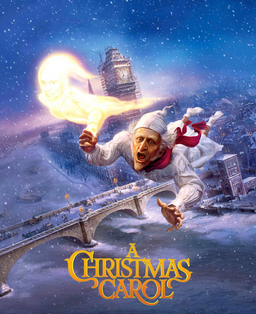
He immediately realized his mistake, and went quickly back to his work, but Scrooge had heard him.
但他立刻意識(shí)到自己所犯的錯(cuò)誤,便又立即埋頭工作,但斯克羅吉已經(jīng)聽(tīng)見(jiàn)了他的話(huà)。
'If I hear another sound from you,' said Scrooge, 'you'll lose you job!'
“如果我再聽(tīng)到你發(fā)出一點(diǎn)聲音的話(huà),”斯克羅吉說(shuō),“你就會(huì)丟掉這份工作!”
'Don't be angry with him, uncle,' said the nephew. 'come and have dinner with us tomorrow.'
“舅舅,別生他的氣,”外甥說(shuō)。“明天來(lái)和我們一起吃晚飯吧。”
'Dinner with you? I'll see you dead first!'
“和你們吃晚飯?門(mén)兒也沒(méi)有!”
'But why won't you come? Why?'
“那你為什么不來(lái)呢?為什么?”
'Because Christmas is humbug! Good afternoon!'
“因?yàn)槭フQ節(jié)是個(gè)騙人的把戲!再見(jiàn)!”
'I want nothing from you. I ask nothing of you. Why can't we be friends?'
“我什么也不要你送給我,我什么都不問(wèn)你要。我們?yōu)槭裁床荒艹蔀榕笥涯兀俊?/div>
'Good afternoon!' said Scrooge.
“再見(jiàn)!”斯克羅吉說(shuō)。
'I am sorry, with all my heart, to find you like this. I have never wanted to argue with you.
“看到你這樣,我真感到難過(guò),我從來(lái)就沒(méi)想過(guò)要與你爭(zhēng)吵。
But I came to see you and invite you because it's Christmas, and so I'll say, a merry Christmas, uncle!'
但我來(lái)是為了看看你并邀請(qǐng)你,因?yàn)槭鞘フQ節(jié),所以我要說(shuō)一聲,舅舅,圣誕快樂(lè)!”
'Good afternoon,' said Scrooge. 'And a happy new year!'
“再見(jiàn)。”斯克羅吉說(shuō)。“新年快樂(lè)!”
'Good afternoon!' said Scrooge.
“再見(jiàn)!”斯克羅吉說(shuō)。
His nephew left the room, without an angry word, stopping only to wish Bob Cratchit a merry Christmas.
他外甥離開(kāi)了房間,沒(méi)有一句慍怒之言。他停下來(lái)只是為了祝鮑勃·克拉奇蒂圣誕快樂(lè)。
Then two other gentlemen came in.
然后進(jìn)來(lái)了另外兩位紳士。
They were large, round, comfortable-looking men, with books and papers in their hands.
他們身材魁梧,胖胖的,儀表堂堂,手里拿著書(shū)和文件。
'This is Scrooge and Marley's, I think,'said one of them, looking at the papers that he was carrying.
“我想,這是斯克羅吉和馬利的辦公室吧,”其中一位看著手中的文件問(wèn)到。
'Am I speaking to Mr Scrooge or Mr Marley?'
“你是斯克羅吉先生還是馬利先生?”
'Mr Marley is dead,' scrooge replied. 'He died seven years ago today, on Christmas Eve.'
“馬利先生死了,”斯克羅吉回答說(shuō)。“他是七年前的今天死的,死在圣誕夜。”
'I'm sure that you are just as kind to the poor as your partner,' said the gentleman, smiling.
“我肯定你對(duì)窮人同你的合伙人的態(tài)度一樣好,”紳士微笑著說(shuō)。
What was true was that Scrooge was just as mean as Marley, and Marley had been just as mean as Scrooge.
事實(shí)是斯克羅吉同馬利一樣的吝嗇,馬利在世時(shí)也曾和斯克羅吉一樣吝嗇。
'At this happy time of year, Mr Scrooge,' the gentleman went on, taking up his pen, 'we should help poor people who have no food or clothes or homes.'
“在一年中這個(gè)幸福的日子里,斯克羅吉先生,”紳士拿起筆繼續(xù)說(shuō),“我們應(yīng)該幫助那些沒(méi)有衣食和無(wú)家可歸的窮人。”
'Are there no prisons?' asked Scrooge coldly.
“沒(méi)有看守所嗎?”斯克羅吉冷冷地問(wèn)。
'Plenty of prisons,' said the gentleman. 'And the workhouses, where poor people can live and work? Are they still open?'
“有很多看守所,”紳士說(shuō)。“還有可供窮人生活和工作的濟(jì)貧院呢?它們還開(kāi)著嗎?”
'Yes, they are, I'm sorry to say.'
“是的,它們開(kāi)著,很抱歉。”
'I'm happy to hear It,' said Scrooge.
“我很高興聽(tīng)到這個(gè),”斯克羅吉說(shuō)。
'I thought, from what you said at first, that perhaps these useful places were closed, for some reason.'
“聽(tīng)你最開(kāi)始說(shuō)的,我還以為這些能夠提供幫助的地方由于某種原因都關(guān)掉了呢。”
'But some of us feel,' replied the gentleman, 'that these places don't offer enough to poor people.
“但是我們有些人感到,”紳士回答說(shuō),“這些地方無(wú)法為窮人提供足夠的東西。
We're hoping to give some meat and drink, and wood for a fire, to people who need all these things.
我們希望為那些需要幫助的人提供一些肉類(lèi),飲料和柴火。
This is a time when we should all be able to enjoy ourselves.
這個(gè)時(shí)候我們都應(yīng)該能夠過(guò)得開(kāi)心。
How much will you give, sir?'
你能給多少,先生?”
'Nothing!' scrooge replied. 'I don't have a merry Christmas myself, and I won't pay for other people to be merry.
“什么都不給!”斯克羅吉回答說(shuō)。“我自己圣誕節(jié)都不快樂(lè),所以我也不會(huì)花錢(qián)去讓其他人快樂(lè)。











